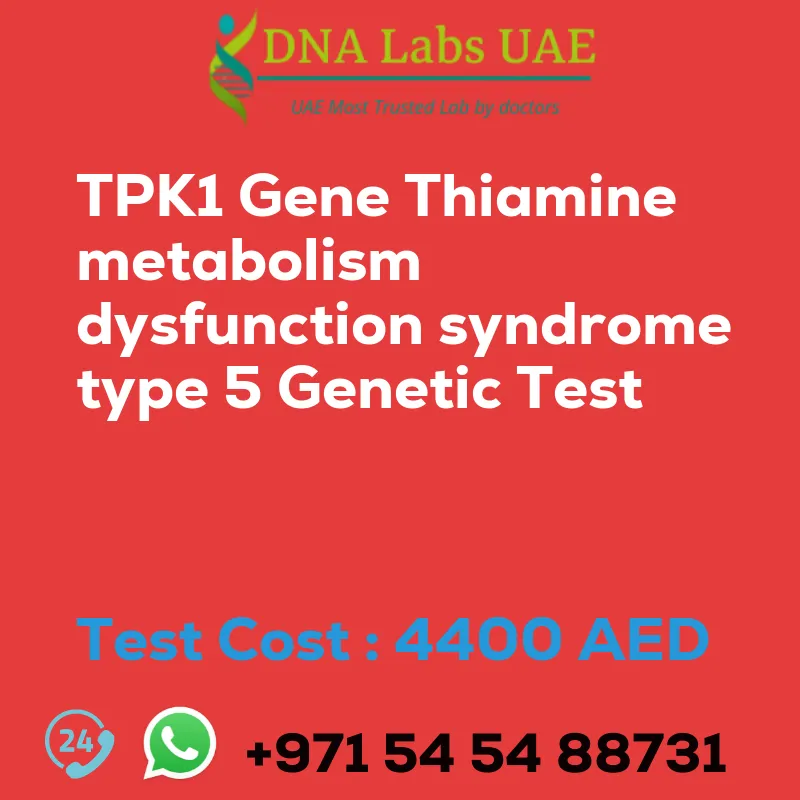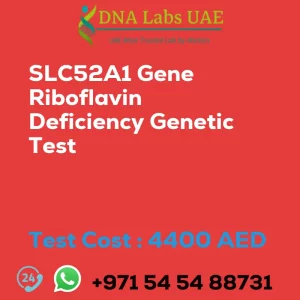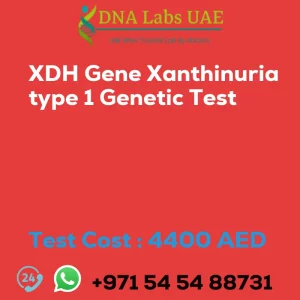TPK1 Gene Thiamine Metabolism Dysfunction Syndrome Type 5 Genetic Test
Components: TPK1 Gene Thiamine metabolism dysfunction syndrome type 5 Genetic Test
Price: 4400.0 AED
Sample Condition: Blood or Extracted DNA or One drop Blood on FTA Card
Report Delivery: 3 to 4 Weeks
Method: NGS Technology
Test type: Metabolic Disorders
Doctor: General Physician
Test Department: Genetics
Pre Test Information: Clinical History of Patient who is going for TPK1 Gene Thiamine metabolism dysfunction syndrome type 5 NGS Genetic DNA Test. A Genetic Counselling session to draw a pedigree chart of family members affected with Thiamine metabolism dysfunction syndrome type 5.
Test Details
TPK1 gene thiamine metabolism dysfunction syndrome type 5 is a rare genetic disorder that affects the metabolism of thiamine, also known as vitamin B1. This disorder is caused by mutations in the TPK1 gene, which is responsible for encoding an enzyme called thiamine pyrophosphokinase.
Thiamine is an essential nutrient that plays a crucial role in energy metabolism and the functioning of the nervous system. In individuals with TPK1 gene thiamine metabolism dysfunction syndrome type 5, the mutations in the TPK1 gene result in a deficiency or impaired function of the thiamine pyrophosphokinase enzyme. This leads to a decreased ability to convert thiamine into its active form, thiamine pyrophosphate.
The symptoms of TPK1 gene thiamine metabolism dysfunction syndrome type 5 can vary widely but may include neurologic abnormalities such as developmental delay, intellectual disability, seizures, muscle weakness, and movement disorders. Other symptoms may include cardiac abnormalities, gastrointestinal issues, and respiratory problems.
NGS (Next-Generation Sequencing) genetic testing can be used to identify mutations in the TPK1 gene. This type of genetic testing involves sequencing the entire coding region of the gene to identify any genetic variants or mutations that may be present. NGS genetic testing for TPK1 gene thiamine metabolism dysfunction syndrome type 5 can help provide a definitive diagnosis and guide treatment decisions.
It can also be used for carrier testing in individuals with a family history of the disorder or for prenatal testing in families at risk of having a child with the condition. It is important to consult with a healthcare professional or genetic counselor to discuss the benefits, limitations, and implications of genetic testing for TPK1 gene thiamine metabolism dysfunction syndrome type 5. They can provide guidance and support throughout the testing process and help interpret the results.
| Test Name | TPK1 Gene Thiamine metabolism dysfunction syndrome type 5 Genetic Test |
|---|---|
| Components | |
| Price | 4400.0 AED |
| Sample Condition | Blood or Extracted DNA or One drop Blood on FTA Card |
| Report Delivery | 3 to 4 Weeks |
| Method | NGS Technology |
| Test type | Metabolic Disorders |
| Doctor | General Physician |
| Test Department: | Genetics |
| Pre Test Information | Clinical History of Patient who is going for TPK1 Gene Thiamine metabolism dysfunction syndrome type 5 NGS Genetic DNA Test A Genetic Counselling session to draw a pedigree chart of family members affected with Thiamine metabolism dysfunction syndrome type 5 |
| Test Details |
TPK1 gene thiamine metabolism dysfunction syndrome type 5 is a rare genetic disorder that affects the metabolism of thiamine, also known as vitamin B1. This disorder is caused by mutations in the TPK1 gene, which is responsible for encoding an enzyme called thiamine pyrophosphokinase. Thiamine is an essential nutrient that plays a crucial role in energy metabolism and the functioning of the nervous system. In individuals with TPK1 gene thiamine metabolism dysfunction syndrome type 5, the mutations in the TPK1 gene result in a deficiency or impaired function of the thiamine pyrophosphokinase enzyme. This leads to a decreased ability to convert thiamine into its active form, thiamine pyrophosphate. The symptoms of TPK1 gene thiamine metabolism dysfunction syndrome type 5 can vary widely but may include neurologic abnormalities such as developmental delay, intellectual disability, seizures, muscle weakness, and movement disorders. Other symptoms may include cardiac abnormalities, gastrointestinal issues, and respiratory problems. NGS (Next-Generation Sequencing) genetic testing can be used to identify mutations in the TPK1 gene. This type of genetic testing involves sequencing the entire coding region of the gene to identify any genetic variants or mutations that may be present. NGS genetic testing for TPK1 gene thiamine metabolism dysfunction syndrome type 5 can help provide a definitive diagnosis and guide treatment decisions. It can also be used for carrier testing in individuals with a family history of the disorder or for prenatal testing in families at risk of having a child with the condition. It is important to consult with a healthcare professional or genetic counselor to discuss the benefits, limitations, and implications of genetic testing for TPK1 gene thiamine metabolism dysfunction syndrome type 5. They can provide guidance and support throughout the testing process and help interpret the results. |








